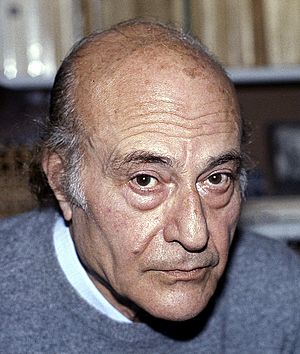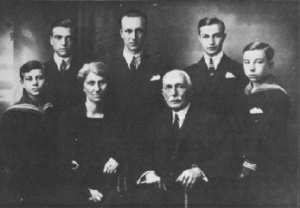Odysseas Elytis facts for kids
Quick facts for kids
Odysseus Elytis
|
|
|---|---|

Odysseus Elytis in 1974
|
|
| Born | Odysseas Alepoudellis 2 November 1911 Heraklion, Republic of Crete |
| Died | 18 March 1996 (aged 84) Athens, Greece |
| Occupation | Poet |
| Nationality | Greek |
| Alma mater | University of Athens (no degree) |
| Literary movement | Romantic modernism, Generation of the '30s |
| Notable awards | Nobel Prize in Literature 1979 |
| Signature | |
 |
|
Odysseus Elytis (born Odysseus Alepoudellis; 2 November 1911 – 18 March 1996) was a famous Greek poet, writer, and translator. He is known as a major figure in a style of writing called romantic modernism. Many people consider him one of the best poets of the late 1900s. His most famous work, Axion Esti, is seen as a very important poem. In 1979, he won the Nobel Prize in Literature, which is a huge award for writers.
Contents
Biography
Odysseus Elytis was born in Heraklion, on the island of Crete, on November 2, 1911. His family made olive oil in Lesbos. Later, his family moved to Athens. He finished high school there and also took classes at the law school at the University of Athens.
In 1935, Elytis published his first poem. It appeared in a journal called New Letters. Friends like George Seferis encouraged him. His unique and fresh style helped start a new time in Greek poetry. This happened after the Second World War.
From 1969 to 1972, Greece was under military rule. During this time, Elytis lived in Paris. He was a very private person. He always worked hard to find poetic truth and experience.
Military Service and War
In 1937, Elytis joined the military. He was a cadet at the National Military School in Corfu. During World War II, he became a Second Lieutenant. He served on the front lines of the battlefields. Even during the war, Elytis continued to publish poems and essays.
He was also a member of the Association of Greek Art Critics.
Work in Media and Awards
Elytis worked as a Programme Director for the Greek National Radio Foundation twice. This was from 1945–46 and again from 1953–54. He was also on the board of the Greek National Theatre. He was president of the Greek Radio and Television board.
In 1960, he won the First State Poetry Prize. In 1965, he received the Order of the Phoenix. Later, in 1975, he was given an honorary degree from Thessaloniki University. He also became an honorary citizen of Mytilene.
Travels and Connections
Elytis lived in Paris from 1948–1952 and again from 1969–1972. While there, he studied literature at the Sorbonne. He met many important artists and writers of the time. These included André Breton, Pablo Picasso, and Henri Matisse. He became good friends with Tériade, who published works by famous artists.
Elytis and Teriade both came from Lesbos. They shared a love for the Greek painter Theophilos. Their friendship grew stronger in 1939 when Elytis' first poetry book, "Orientations," was published. From Paris, he traveled to Switzerland, England, Italy, and Spain. He also represented Greece at international meetings.
He traveled to the U.S.A. in 1961. He also visited the Soviet Union in 1963 and Bulgaria in 1965.
Death
Odysseus Elytis died in Athens on March 18, 1996. He was 84 years old and passed away from a heart attack. He was planning to travel overseas at the time. His funeral was held at the First Cemetery of Athens.
Poetry
Elytis' poetry was active for over forty years. It covered many topics and styles. He focused on expressing things that were special and full of feeling. He used ideas from Ancient Greece and Byzantium. But he mainly wrote about modern Greek culture. He tried to create a new way of understanding Greek identity.
His main goal was to help people let go of unfair regrets. He wanted to connect nature with strong moral ideas. He aimed for clear and open expression. Most importantly, he wanted to understand the mystery of light, which he called "the metaphysics of the sun." He saw himself as a "worshiper" of light.
A special technique he used was "inner architecture." This is clear in many of his poems. His most famous work is It Is Truly Meet (Το Άξιον Εστί). This poem became a beloved song when Mikis Theodorakis set it to music. Greeks sing its verses for justice, resistance, and its beauty. Elytis also wrote his ideas in essays called The Open Papers. Besides poetry, he translated other poems and plays. He also made many collage pictures. His poetry has been translated into eleven languages.
Works
Poetry
- Orientations (Προσανατολισμοί, 1939)
- Sun The First Together With Variations on A Sunbeam (Ηλιος ο πρώτος, παραλλαγές πάνω σε μιαν αχτίδα, 1943)
- An Heroic And Funeral Chant For The Lieutenant Lost In Albania (Άσμα ηρωικό και πένθιμο για τον χαμένο ανθυπολοχαγό της Αλβανίας, 1946)
- To Axion Esti—It Is Worthy (Το Άξιον Εστί, 1959)
- Six Plus One Remorses For The Sky (Έξη και μια τύψεις για τον ουρανό, 1960)
- The Light Tree And The Fourteenth Beauty (Το φωτόδεντρο και η δέκατη τέταρτη ομορφιά, 1972)
- The Sovereign Sun (Ο ήλιος ο ηλιάτορας, 1971)
- The Trills of Love (Τα Ρω του Έρωτα, 1973)
- The Monogram (Το Μονόγραμμα, 1972)
- Step-Poems (Τα Ετεροθαλή, 1974)
- Signalbook (Σηματολόγιον, 1977)
- Maria Nefeli (Μαρία Νεφέλη, 1978)
- Three Poems under a Flag of Convenience (Τρία ποιήματα με σημαία ευκαιρίας 1982)
- Diary of an Invisible April (Ημερολόγιο ενός αθέατου Απριλίου, 1984)* Krinagoras (Κριναγόρας, 1987)
- The Little Mariner (Ο Μικρός Ναυτίλος, 1988)
- The Elegies of Oxopetra (Τα Ελεγεία της Οξώπετρας, 1991)
- West of Sadness (Δυτικά της λύπης, 1995)
- Eros, Eros, Eros: Selected and Last Poems (Copper Canyon Press, 1998) (translated by Olga Broumas)
Prose, essays
- The True Face and Lyrical Bravery of Andreas Kalvos (Η Αληθινή φυσιογνωμία και η λυρική τόλμη του Ανδρέα Κάλβου, 1942)
- 2x7 e (collection of small essays) (2χ7 ε (συλλογή μικρών δοκιμίων))
- (Offering) My Cards To Sight (Ανοιχτά χαρτιά (συλλογή κειμένων), 1973)
- The Painter Theophilos (Ο ζωγράφος Θεόφιλος, 1973)
- The Magic Of Papadiamantis (Η μαγεία του Παπαδιαμάντη, 1975)
- Report to Andreas Empeirikos (Αναφορά στον Ανδρέα Εμπειρίκο, 1977)
- Things Public and Private (Τα Δημόσια και τα Ιδιωτικά, 1990)
- Private Way (Ιδιωτική Οδός, 1990)
- Carte Blanche («Εν λευκώ» (συλλογή κειμένων), 1992)
- The Garden with the Illusions (Ο κήπος με τις αυταπάτες, 1995)
- Open Papers: Selected Essays (Copper Canyon Press, 1995) (translated by Olga Broumas and T. Begley)
Art books
- The Room with the Pictures (Το δωμάτιο με τις εικόνες, 1986) – collages by Odysseus Elytis, text by Evgenios Aranitsis
Translations
- Second Writing (Δεύτερη γραφή, 1976)
- Sappho (Σαπφώ)
- The Apocalypse (by John) (Η αποκάλυψη, 1985)
Translations of Elytis' work
- Poesie. Procedute dal Canto eroico e funebre per il sottotenente caduto in Albania. Trad. Mario Vitti (Roma. Il Presente. 1952)
- 21 Poesie. Trad. Vicenzo Rotolo (Palermo. Istituto Siciliano di Studi Bizantini e Neoellenici. 1968)
- Poèmes. Trad. Robert Levesque (1945)
- Six plus un remords pourle ciel. Trad. F. B. Mache (Fata Morgana. Montpellier 1977)
- Körper des Sommers. Übers. Barbara Schlörb (St. Gallen 1960)
- Sieben nächtliche Siebenzeiler. Übers. Günter Dietz (Darmstadt 1966)
- To Axion Esti – Gepriesen sei. Übers. Günter Dietz (Hamburg 1969)
- The Axion Esti. Tr. E. Keeley and G. Savidis (Pittsburgh 1974 – Greek & English)(repr. London: Anvil Press, 1980 – English only)
- Lofwaardig is. Vert. Guido Demoen (Ghent 1989-1991)
- The Sovereign Sun: selected poems. Tr. K. Friar (1974; repr. 1990)
- Selected poems. Ed. E. Keeley and Ph. Sherrard (1981; repr. 1982, 1991)
- Maria Nephele, tr. A. Anagnostopoulos (1981)
- Çılgın Nar Ağacı, tr. C. Çapan (Istanbul: Adam Yayınları, 1983)
- What I love: selected poems, tr. O. Broumas (1986) [Greek & English texts]
See also
 In Spanish: Odysséas Elýtis para niños
In Spanish: Odysséas Elýtis para niños
 | Kyle Baker |
 | Joseph Yoakum |
 | Laura Wheeler Waring |
 | Henry Ossawa Tanner |


